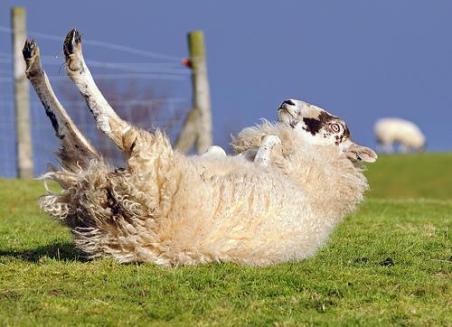"Why, my soul are you downcast? Why so disturbed within me?" (Psalm 42:5 NIV)
As you likely know, Rob and I have been burying ourselves in Psalm 23 for the past few weeks. We are tag-team preaching our way through David’s most famous scriptures. Rob has the evens and I have the odds, so we each have extra time to soak in the text. This week, verse 3 deals with the issue of soul restoration. Remarkably, even under the Good Shepherd’s tender care, we can still be cast down.

This little missive was written by an actual African shepherd. His in-field experience has shed considerable light on the many commonalities between sheep and a people. This reality of ‘cast sheep’ or ‘cast down’ has captivated my attention.
A cast down sheep has lost it’s footing and wound up on it’s back. Evidently, sheep have very flat backs and cannot right themselves when their worldview inverts. They will try: bleating aloud and pawing at the air in panic, thus worsening their condition. As the sheep struggles, gasses build up in their stomach. This expansion cuts off circulation from their extremities. In hot weather, the cast sheep can perish within hours. In cooler weather, they may suffer for full days. These downcast sheep are helpless apart from the intervention of their shepherd. In their compromised position, they are extremely vulnerable to pray. The buzzards will circle, ready to usher the sheep across death’s final threshold.
I see the spiritual implications in David’s writing. We get downcast. Our thought life and circumstances have a way of flipping us on our backs and we are incapable of righting ourselves. As a sheep bleats for his shepherd, we cry out to God: “Help us! Restore us! Hurry!” The anxieties well up within us, just as toxic as the intestinal gasses. We panic, worsening our condition and wearing our our frail frames. Finally, the Shepherd arrives: willing and able to return us to our feet. Will we cooperate with His effort?
Cast sheep must be righted. The shepherd goes to great lengths to seek them out in their helpless estate. When he finds them, he straddles them, turns them on their bellies and pulls them up to their feet. It is an intimate act, for sure. He pins the sheep between his knees and reaches down to rub their legs, urging circulation again. He does not let go until he is sure that they have solid footing. When he loosens his grip, he watches to make sure their equilibrium is fully regained: often they tumble to their backs and the process begins once more. Once the sheep is fully restored, they return to their happy sheep activities and the shepherd breathes a sigh of relief.
Isn’t this the picture of peace Christ offers us amidst our anxieties? We, like sheep, are so prone to working ourselves into a frenzy. We allow ourselves to be cast down and the enemy circles in for the kill. But our Good Shepherd is constantly counting. He leaves the ninety-nine to go after the one. He seeks us out, understands our ailment, and tenderly returns us to our right footing if we’ll only allow Him.
Let’s look once more at dear David’s words in Psalm 42.
"Why, my soul, are you downcast? Why so disturbed in me? Put your hope in God, for I will yet praise Him, my Savior and my God." (Psalm 42:5 NIV)
Sheep live their best life when they trust the shepherd enough to stay near. The same is true of us. When we can recognize that our Shepherd is good, we can lean into His compassionate care. We can address our anxieties with confidence in our Keeper. We can even guard against being cast down by choosing praise instead.
“The answer to deep anxiety is deep adoration of God.” (Ann Voskamp)
Lord, today we acknowledge our tendency toward being cast down. We, like sheep, have gaping weaknesses and stubborn habits. Forgive us for our fears and help us cast them to You before we become cast down ourselves. We trust in Your ability to care for and rescue Your own. Even so, we’d rather praise then wallow upon the ground. Thank You for being our loving Shepherd. We commit to keeping close. Amen.